#Protector of the Dharma
Explore tagged Tumblr posts
Text
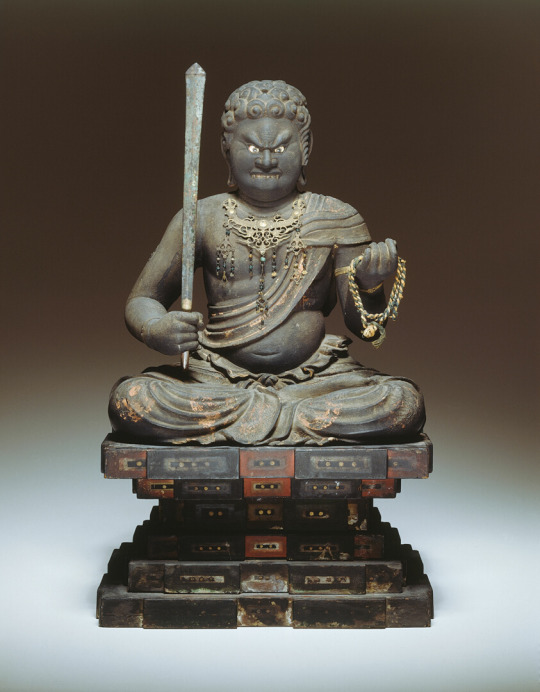
"HE IS EQUIPPED TO GUIDE THE SPIRITUAL TRAVELER PAST TEMPTATION ON THE PATH TO ENLIGHTENMENT."
PIC INFO: Resolution at 843×1080 -- Fudō Myōō, a Buddhist deity and guardian of the Buddhist law. His name translates to "The Undefeatable Enlightened King of Buddhism," or "the immovable or unshakable one."
DATE: 13th century (1199-1399)
ARTIST: Japan
DEPARTMENT: Arts of Asia
TITLE: Fudo Myo-o
ORIGIN: Japan (Artist's nationality)
MEDIUM: Wood with polychromy and gilt-bronze accessories
CREDIT LINE: Gift of the Joseph and Helen Regenstein Foundation
OVERVIEW: "The name Fudo Myo-o means “the immovable or unshakable one.” He is one of five myo-o, or lords of light, whose threatening appearance guards the Law of Buddhism. He is equipped to guide the spiritual traveler past temptation on the path to enlightenment. Fudo’s bulging eyes, piercing stare, and protruding fangs express the intensity of his wrath against evil. Seated on a stylized rock formation that symbolizes his steadfastness, he once held his attributes, a rope and sword (these have been removed for conservation), which were used to subdue evil forces and to cut through the ignorance that is the source of suffering. This finely modeled figure reflects the highly detailed, realistic direction taken by Japanese sculptors in the Kamakura period (1185–1333)."
-- THE ART INSTITUTE OF CHICAGO
Source: www.artic.edu/artworks/8085/fudo-myo-o.
#The Art Institute of Chicago#Lords of Light#Buddhist deity#Guardian of the Buddhist law#The Undefeatable Enlightened King of Buddhism#Japanese Buddhism#Art Institute of Chicago#Statue of Fudō Myōō#Acala#Early 13th century#Kamakura period#The Immovable#Acalanātha#Immovable Lord#Noble Immovable Lord#Wrathful deity#Protector of the Dharma#East Asian Buddhism#Japanese Culture#Japan#Japanese#Buddhist#Fudō Myōō Statue#Japanese Esoteric Buddhism#Dharmapala#Buddhism#Fudō Myōō#The Unshakable One#The Immovable or Unshakable One#Fudo Myo-o
10 notes
·
View notes
Text
The primary motivational impulse of the 27 nakshatras.
Dharma. ( To hold , that which preserves , conscience , true living )
☘️Asvini - Spontaneous , healing field, instinct.
☘️Ashlesha - Secretive , suspicious, good observers.
☘️Vishakha - Goal oriented , intense capacity for hard work .
☘️Anuradha - Soft , friendly , evolution.
☘️Dhanishta - Artistic , wealthy , resourcefulness.
☘️Shatabhisha. - Solitary, philosophical , healing, introverted
☘️Pushya - benevolence , generosity, nourishment.
Artha ( Purpose , Stability, wealth )
💚Bharani - Intense , rebellious
💚Punarvasu - Nurturing , Harmony
💚Makha - Regal , highly individualistic , related to ancestors , fiery .
💚Swati - Charming , like to balance , diplomacy , sense of fairness.
💚Jyeshtha - Competitive, sharp , like to get even , powerful
💚Sravana - Perseverance , organizational skills , receptivity.
💚Purva Bhadrapada - Powerful & retribution , detachment , generosity.
Kama ( Desires , relationships )
🌸Krittika - Piercing , direct , independence.
🌸Ardra - Churning , change , transformation , Catharsis.
🌸Purva Phalguni - Lucky , self centred, rest , creativity.
🌸Chitra - To build , architecture, aesthetic , dynamic.
🌸Moola - Digging deeper , occult, depth , destruction leading to new creation.
🌸Uttara Bhadrapada - Determined, wise , elusive , shy.
Moksha ( To find the truth of oneself , to unite )
🪷Rohini - Creation , Nurture, beauty , stability
🪷Mrighashira - Tenderness , playfulness , seeking.
🪷Uttaraphalguni - Radiance , truth , independent.
🪷Hasta - Skillful , Craft , healing , Awareness
🪷Purva ashada - Adventurous spirit, faith
🪷Uttara ashada - Introspective , strong willpower , traditionalism.
🪷Revati. - Nourishment, protector , equinamous.

#astrology#astro observations#astrology observations#counseling#vedic#vedic astro notes#astro notes#vedic astro observations#astrology blog#astrologer#rohini nakshatra#nakshatras
276 notes
·
View notes
Text
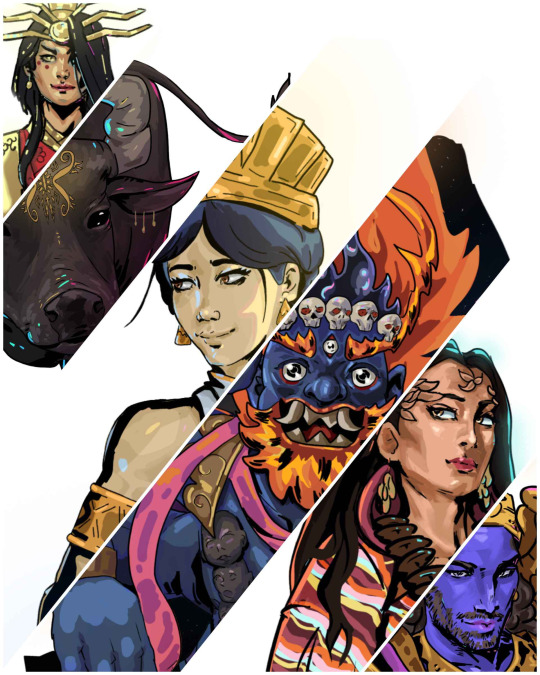
Legendary Figures from Asia in Hades Style.
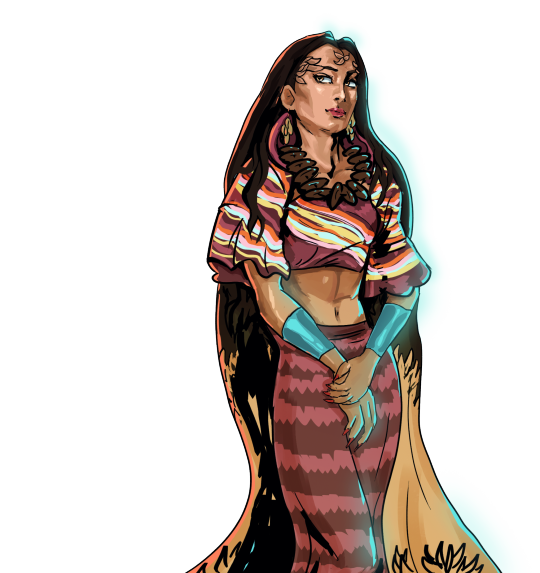
Lakapati is the Transgender Filipino Goddess of Agriculture, and oversees the nurture of her people. She is prayed to for a bountiful harvest and blesses the crops and livestock. Lakapati displays both masculine and feminine traits and is sometimes depicted as one or the other or fluidly. Her husband is Mapulon the God of Seasons as their union coincides with how seasons and agriculture are importantly tied.
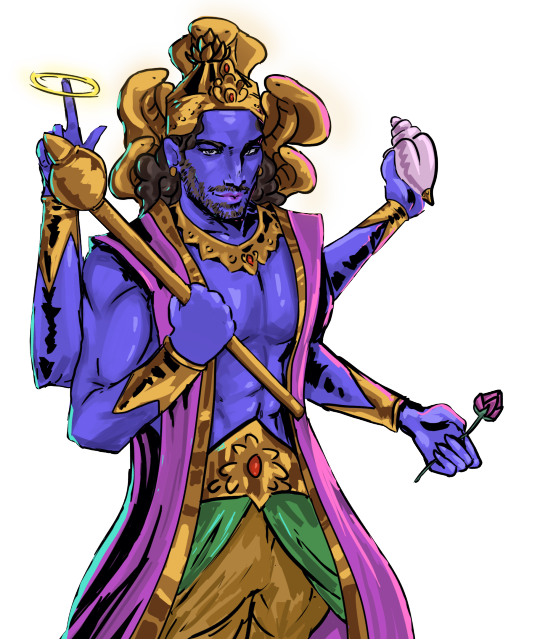
Vishnu is one of the most important deities in Hindu theology. As the God of Time, and the Preserver, he is one of three called the Trimurti along with Shiva the Destroyer, and Brahma the Creator. Like his fellow gods, Vishnu has many avatars including the legendary hero Vamana, and even the Buddha (in some sects of Hinduism).
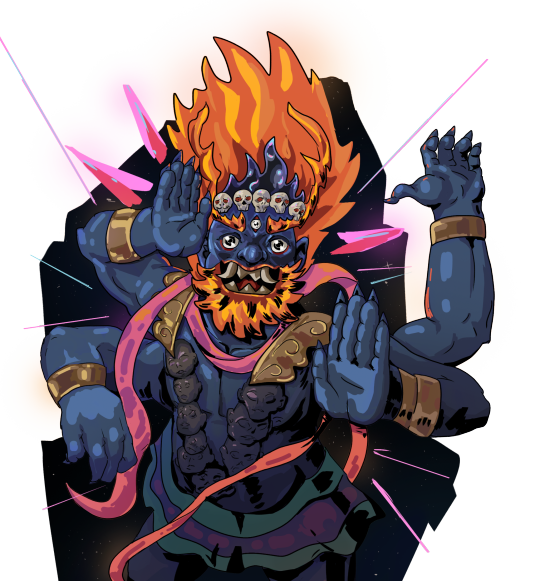
Mahakala is one of the great Dharmapala (Protector of the Dharma) in Tibetan Buddhist Cosmology. His domain is the void, and he maintains command of time and death. He is depicted blue or black as all colors absorbed represent the infinitude of absolute reality (as is all life is absorbed into him in time). As a fearsome deity, he reminds his believers of the wrath that would incur if they were to stray from the Dharma. The five skulls on his crown represent the five Kleshas (negative aspects such as ignorance, selfishness, pride, envy, and depression) that would be transformed into the five wisdoms (knowledge, discipline, observance, equanimity, self-reflection) by his power. His roots tie back to the Hindu god Bhairava (an Avatar of Shiva) and has since become an important figure in many Buddhist Sects. When the universe ends, there will be no Chaos, just the void at the end of time, and there, Mahakala remains.
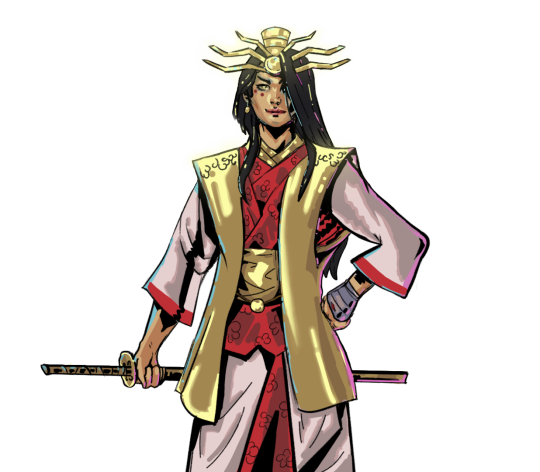
Amaterasu Ōmikami (天照大御神) is the Supreme Deity of the Sun and of Japan. The unbroken line of Imperial Japan was said to begin with the first Emperor, Jimmu said to be descended directly from her. As the Sun Goddess she is in charge of overseeing the heavens and wrangling her numerous siblings including, Tsukuyomi (月読命) the Moon God, Susanoo (スサノヲ) the God of Storms and lesser known Watasumi (海神), the Dragon Spirit of the Sea among many other gods and spirits.
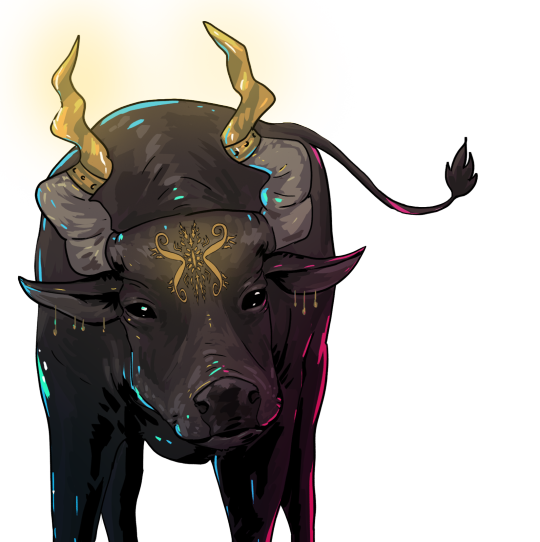
Kting Vor is a Cambodian/Vietnamese Mythological Beast. One distinct feature is its longer, twisting horns. It is called the Snake Eating Cow (or Water Buffalo) because of its unusual diet. Isn't he the cutest...
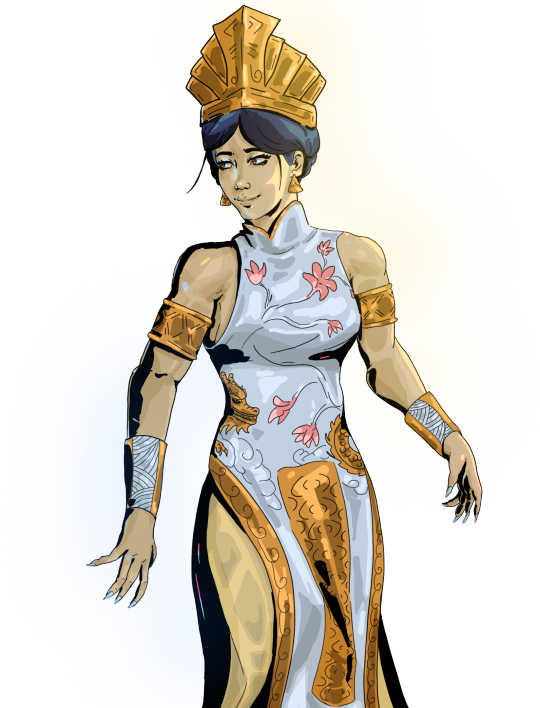
Âu Cơ is the Goddess who lives upon a legendary snow mountain in Vietnam. She is said to create the first people who lived in what is now the Southern Region of China/Northern Vietnam. She was married to the Dragon Lord Lạc Long Quân. Their union was not everlasting for Âu Cơ longed to return to the mountain and Lord Lạc Long Quân desired to return to his home in the sea. They divided their children in their separation. The ones who followed Âu Cơ populated her mountains and the decedents of the ones who followed Lord Lạc became known as the Hùng Kings.
#hades fanart#hades game#artists on tumblr#hades supergiant#digital art#hades#hades 2#supergiant hades#hades art#oc art
61 notes
·
View notes
Text


"O Indra! Give us the highest of riches, the skill and knowledge for action. Give us well-being and the vigor of vitality to our limbs. Protect us against injury. May we become sweet of speech and may our days be days that are full of light." ~Rigveda 2.22.6
Lord Indra ॐ Talon Abraxas Lord Indra in Buddhism: Unveiling the Divine Role in Buddhist Cosmology Historical Context of Indra in Buddhism Origins and Evolution of Indra Lord Indra Lord, originally a prominent Vedic deity, was assimilated into Buddhist lore during the religion's formative years. This period was characterized by the fusion of various religious and cultural elements in ancient India, leading to a syncretic representation of Indra in Buddhist texts. Influence Across Asia As Buddhism expanded across Asia, Indra's depiction varied, adapting local influences and gaining distinct attributes in regions like Tibet, China, Japan, and Southeast Asia.
Indra's Role and Symbolism Protector and Leader In Buddhist lore, Indra is often portrayed as a protector of the Dharma (Buddhist teachings) and a leader among the gods. His role as a guardian deity is emphasized in many Buddhist scriptures. Moral and Spiritual Guide In contrast to his more martial and sovereign characteristics in Hinduism, Indra often embodies moral strength and spiritual guidance in Buddhism. He is viewed as an exemplar of righteous living and devotion to the Dharma.
Aspect Description in Buddhism Role Protector of Dharma, moral & Spiritual guide Symbolism Righteousness, leadership, protection of faith Depiction in Texts Appears in Jataka tales, interactions with Buddha Artistic Representation Depicted with symbolic attributes, carying across regions Festivals & Rituals Celebrated in various Buddhist Traditions across Asia Philosophical Influence Concepts like karma, and ethical living Modern Relevance Continues to influence contemporary Buddhist practice & culture
34 notes
·
View notes
Text


As the largest black bird in the world, with its lustrous black plumage and a raucous voice, the raven is seen as a symbol of power, mischief, mystery, wisdom and intelligence. Yet, it is in Bhutan where the raven is given its highest place both on the royal crown and as the national bird. The hallowed status of the raven in Bhutan stems from its association with the raven-faced deity, Legön Jarok Dongchen.... A wrathful deity with a large raven beak, Legön (or the Lord of Action) is one of the many forms of the chief dharma protector Mahakala and, as his name suggests, is known for effectiveness and speedy activity.
#The second picture is a study of An Unkindness by owen gent#not sure how successful it is but i do like the ravens#hetalia#hetalia ocs#hws india#aph india#aph bhutan#hws bhutan#bhutind#ig???#historically inaccurate hair is historically inaccurate
87 notes
·
View notes
Text
Chapter-1 part: The Guard Awake
Balpan
Shyamala is trying on a new saree. The green border on the deep red saree looks lovely on her. She fixes her kumkum between her eyebrows when she hears a sweet gurgling sound by her daughter.
The little bundle of joy, Shankara and Shyamala's Brahmi stood on her chubby little legs, her arms outstretched towards her mother.
Little Brahmi takes a step forward causing Shyamala to excitedly rush to her baby girl. She stands near the door and sits on her knees, her fingers motioning for the little girl to come to her mother.
"My sweet daughter is taking her first steps. Come, come. Come to your mother." Shyamala coos at Brahmi who only laughs and carefully makes her way forward.
Carefully balancing, she takes a few steps ahead. Brahmi's body sways a little and Shyamala crouches near to her daughter in case she falls down. She doesn't.
And with three more steps, Brahmi walks right into her mother's arms.
Shyamala hugs her daughter and kisses her face. Brahmi only smiles and emits a cheerful laughter. Holding her baby at her hip, Shyamala runs to Bharati to tell about her daughter's milestone.
Across the Yamuna, the little dark jewel of Nanda's household totters on his little feet. Yashoda leaves the ropes and hurriedly walks to her son, her fingers snapping excitedly to attract baby Krishna's attention as he walks towards his darling mother's arms.
Nanda who had arrived after visiting the village council quietly stands near the courtyard entrance, silently observing Krishna walking towards his mother.
After Yashoda kisses her son in delight, he enters the courtyard and hugs Yashoda and Krishna. Krishna nuzzles into Nanda's chest and closes his eyes, his little hands curling around his mother's neck.
***
"Today I will tell you about the story of our Yadu prince, our princess and how Vishnu took birth into our world, Brahmi. Listen to me carefully," Shankara says, holding Brahmi's hands as she sits on her father's lap.
"Vishnu? The Vishnu whose idol Maa worships secretly? He is a stone, Baba. How can he take birth. A stone can't be a baby." Brahmi's argument makes Shankara smile. He chuckles and ruffles her hair. "Oh, you are still young to understand. Take it as a story."
Despite being a guard in Kamsa's dark and dreary prison cells, Shankara harboured a talent of story-telling. When Shankar and Shyamala were shy newly-weds, Shankara would often narrate different folk stories and tales from old texts to win Shyamala's heart, affection and trust. A pregnant Shyamala would often ask him to narrate stories from the sacred texts so the would-be born child would be a wise being in the future.
Brahmi listened to her father with wide-eyes as he narrated what happened on that fateful night when God was born. The little girl of five summers could not take in the brutal murders of Krishna's siblings, so he had skipped that detail. He would tell her about those brutalities some other day when his little Brahmi would grow older.
For now, she only had to know that the world's saviour, the protector of Dharma had taken birth, and would soon return to his birthland.
"So this Krishna will come back to our Mathura?" Brahmi asks.
"Indeed, my child. He has to avenge his parents, save Mathura from this tyrant king."
"If our king is evil, then why do you go to work at his palace, Baba?"
A wry smile takes its place on Shankara's lips. He kisses her forehead. "Because, we also need to live. For survival, one also has to bow down to the evil and bad. Everybody cannot be a hero."
Brahmi blinks her large eyes at her father. "But Baba, that night, you did not tell anyone about this boy's birth. You did not tell the king." Pecking her father's cheek, she continues, "You saved God. You are a hero too." Brahmi looks at her discarded doll on the floor. "Oh, Baba, my doll is asking for food. I will come back later for more stories."
Shankara's eyes glistened with tears. Brahmi did not realize the meaning behind her words. Indeed children were manifestations of the divine. Their innocence is untainted by the rigid rules and regulations of society. They are pure.
Shankara looks at Shyamala playing with her doll. He mutters to himself. "Who am I to save God? God saves us. I only performed my duty to my God."
***
Brahmi arrives from her school. Shankara and Shyamala had begun sending her to a nearby priestly couple who taught the scriptures, literature and arithmetic when she turned seven. She huffs and sits inside the kitchen while her mother who had been cooking rice asks, "What happened? Why do you look so cross?"
"I saw a guard misbehaving with a woman. They even slapped her. Her husband stepped in, but they beat him up too and took him to prison. What kind of a king do we have? His soldiers have been given full rights to do anything with the public. The Shastras talk about how a king must behave with proper conduct. But look at that demon king!"
Shyamala makes a hushed sound. "Careful, Brahmi. His men are everywhere now. We cannot speak ill of him."
Brahmi turns her face away. "But this is sheer injustice. A place where a woman is insulted can never prosper."
Shyamala brings two plates. Brahmi angrily serves rice on both the plates--one for her mother and one for herself. Shyamala whispers, "Yes, but he can't even show mercy to his sister. Will such a man care about other women?"
Brahmi moves her finger around the hot rice on her plate. "I wanted to argue. Pranava held my wrist tightly and stopped me."
"It was the right thing to do by him then. You would be thrown into prison. Nobody, not even your Baba could get you out."
"So we keep tolerating this?"
"Yes, until our saviour arrives."
Brahmi gulps her food. "This endless waiting will only bring us ruin. We should first help ourselves and then God will help."
In the beautiful land of Vrindavana that boasts of lush green forests, green pastures and abundant Tulsi plants, Mathura's hero bids farewell to his house, his parents, his friends and his childhood sweetheart.
"I must head towards my karmabhoomi, O people of Vrindavana. Bid me farewell with your blessings instead of your tears."
Brahmi lays on her cot and looks up at the night sky. The moon shines brightly, its gentle moon beams falling over her. Now a young age of fourteen, a little wiser and bolder, Brahmi thinks about the future of her homeland.
A cool wind blows. She hears a knock on her door. Unlocking the latch, she finds her father, smiling at her with exhaustion marring his face. "You didn't sleep, Brahmi?"
"I will go to sleep in a while, Baba. Come in. Maa is waiting for you with hot dinner prepared."
She watches her parents talk with each other as Shankara slowly eats his meal. Brahmi thinks about her childhood conversation with her Baba.
"Baba, will this Krishna be my friend too when he comes back?"
"He is Vishnu. He accepts everyone."
"What did he really vanquish all those demons?"
"Yes, Brahmi. He is supreme strength personified, my child. He is God in a mortal's body.
Brahmi crosses her feet and sighs, her eyes drinking in the beautiful silvery light of the moon. Her mind replays her father's description about Krishna as narrated by Devaki and Vasudeva who heard it from secretly visiting sages and messengers.
She whispers in the dark to the silent confidante, the sparkling moon. "You will be the prince of Mathura like the rightful heir you are. Here everybody sees you as Mathura's saviour, as their protector and the upholder of Dharma. Baba might make me meet you so I may see you as the glorious God in mortal form. He says he has been a witness to your divinity. I haven't. You could be God, true, but in case if you want a friend here, I hope you find me."
Shyamala peers from the window. "Oh, you wild wild girl, come inside. Don't sleep in the open. Bad spirits will come to you and tie that hair."
Brahmi groans and braids her hair.
***
@krishna-priyatama @krsnaradhika @krishakamal @ma-douce-souffrance @jukti-torko-golpo @prettykittytanjiro @thegleamingmoon @krishna-sangini @chaliyaaa @kaal-naagin @ramcharantitties @inexhaustible-sources-of-magic @desigurlie @piyatosenainanalaagere
45 notes
·
View notes
Text
The funniest thing I've seen going around in Mahabharat tags is someone going "this tv adaptation/book/fic/person/etc. has made up a bunch of fake stories and thus is horrible and disrespects the religion/xyz character".
Fake made up stories. As opposed to what?!? The old fake made up stories? I have to laugh.
(P.S. I see at least 3 instances of this same thing every single day and I'm not even on Tumblr for more than 15 mins daily.
The constant misrepresentation of what "itihaas"(and also "dharma") as a concept is really funny coming from self-proclaimed protectors of hinduism. Bestie, how am I to believe you care about it if you don't even make the tiniest effort to understand the concept?!?)
-Mod S
#this is not even vagueposting#i see this from different users#DAILY#it's hilarious#mahabharat#mahabharata#hindu mythology#hindublr#desiblr#not an incorrect quote#I'm tired#mod s is always tired#mod: s
43 notes
·
View notes
Text
"LOST" Retrospect: "Who Ordered the Dharma Initiative Purge?"

Years ago, I had a written an article that speculated on which character from the ABC series, "LOST", was responsible for an incident called "the Dharma Purge". After a few re-watches of the series, I wrote this revision of the ARTICLE.
"LOST" RETROSPECTIVE: "WHO ORDERED THE DHARMA INITIATIVE PURGE?"
Seven years ago, I had written this article about a major incident on the ABC television series, "LOST". This incident happened to focus on the murders or "Purge" of the scientific research organization known as the Dharma Initiative. It happened on December 19, 1992; nearly twelve years before the series began and before the crash of Oceanic Airlines 815 flight.
In the Season Five episode, (5.10) "He's Our You", Oceanic Flight 815 survivor and later, time traveler Sayid Jarrah tried to murder young Ben Linus in 1977. In the following episode, another Oceanic time traveler, Dr. Jack Shephard, refused to treat the badly wounded Ben, who was near death. Eventually, two other time traveling castaways, James "Sawyer" Ford and Kate Austen, had taken Ben to the Others aka the Hostiles aka the Natives, a group of island inhabitants who served as its protectors on the behalf of the main protector Jacob, for treatment via Dr. Juliet Burke's instructions. Within a decade-and-a-half, Ben ended up ousting future billionaire Charles Widmore as leader of the Others.
Ever since the series had first aired, many fans had been uncertain of when Ben's tenure as the Others' leader had began - before or after the Purge. As I had stated earlier, the Purge occurred in December 1992, on the same day as Ben's birthday and during the same month as the Others' rejection of Widmore as their leader. Many fans and television critics had automatically assumed Ben had ordered the Purge. I have heard comments that compared Ben to Adolf Hitler. I have also heard comments that compared Ben’s younger self to a "young Hitler". Many people have claimed that it was Ben who had ordered the deaths of the Dharma Initiative members. However, I have my doubts.
During Seasons Three and Four, Ben had offered contradicting comments on whether or not he had ordered the Dharma Initiative Purge. In (3.23) "Through the Looking Glass", he had claimed responsibility of the Purge to Jack:
"Not so long ago, Jack. I made a decision that took the lives of over forty people in a single day"
Unfortunately, Ben had contradicted this claim in two other episodes. In the Season Three episode, (3.20) "The Man Behind the Curtain", he had said this to Oceanic survivor John Locke, while he displayed the remains of Dharma members at a mass grave:
"This is where I came from, John. These are my people. The Dharma Initiative. They came here seeking harmony, but they couldn't even co-exist with the Island's original inhabitants. And when it became clear that one side had to go, one side had to be purged, I did what I had to do. I was one of the people that was smart enough to make sure that I didn't end up in that ditch. Which makes me considerably smarter than you, John."
Ben never claimed responsibility for ordering the Purge to Locke. He had confessed to participating in the Purge. That same episode made it clear that his participation involved killing his abusive father, Dharma Initiative worker, Roger Linus. In fact, Ben also made the same thing clear in the Season Four episode, (4.11) "Cabin Fever", when he had the following conversation with another Oceanic castaway, Hugo "Hurley" Reyes:
HURLEY: So... This is where you shot Locke and left him for dead, huh? BEN: Yes, Hugo, I was standing right where you are now when I pulled the trigger. Should have realized at the time that it was pointless, but... I really wasn't thinking clearly. [Hurley steps back a little] HURLEY: Is that why you killed all these people, too? BEN: I didn't kill them. HURLEY: Well, if the Others didn't wipe out the Dharma Initiative -- BEN: They did wipe them out, Hugo, but it wasn't my decision. HURLEY: Then whose was it? BEN: Their leader's. HURLEY: But I thought you were their leader. BEN: Not always.
Interesting. He had admitted to trying to kill Locke in "The Man Behind the Curtain". But he denied being the one who had ordered the Purge. Also, Ben had been truthful when he told Hurley that he had not always been the Others' leader. The series had featured three other leaders - the ageless Richard Alpert (who eventually became the future leaders' advisor), Eloise Hawking and Widmore. Although some fans remain convinced that Ben had ordered the Purge, there are a good number of fans who hold Widmore responsible.
Thanks to a flashback in the Season Five episode called (5.12) "Dead Is Dead" - viewers learned that Widmore had definitely been the leader of the Others back in 1988. And in another Season Four episode called (4.09) "The Shape of Things to Come", viewers learned in a flash forward scene set in London that Ben had taken the leadership of the Others away from Widmore:
WIDMORE: I know who you are, boy. What you are. I know that everything you have you took from me. So... Once again I ask you: Why are you here? BEN: I'm here, Charles, to tell you that I'm going to kill your daughter. Penelope, is it? And once she's gone... once she's dead... then you'll understand how I feel. And you'll wish you hadn't changed the rules. [Widmore shifts in his bed.] WIDMORE: You'll never find her. [Ben turns to leave.] WIDMORE: That island's mine, Benjamin. It always was. It will be again.
I found it interesting that Widmore had regarded the island as "his". And there were other aspects of Widmore that I found interesting. The Season Five episode, (5.03) "Jughead", had revealed Widmore as a member of the Others, as far back as 1954 (when he was seventeen years-old). As one of the Others, Widmore (along with Richard and Hawking) had participated in a previous purge - that of U.S. Army personnel, who had brought a hydrogen bomb nicknamed "Jughead" with them to the island. On other occasions, Widmore had this inclination to kill anyone he deemed a threat to the island's secrecy. He killed a fellow Other to prevent the latter from leading Locke, Sawyer and Juliet to Richard's location in 1954. The 1988 flashback from "Dead Is Dead" revealed Ben's refusal to kill Danielle Rousseau and her baby, Alex. Instead, he claimed Alex as his child and threatened Danielle to stay away. This decision had angered Widmore, who had expected Ben to kill both. Why were Danielle and Alex's deaths that important to Widmore? Ironically, Widmore finally got his way regarding Danielle and Alex, thanks to Martin Keamy, the mercenary he had sent to the island to snatch Ben in Season Four.
So, when did Ben Linus replace Charles Widmore as leader of the Others? Before December 19, 1992? Or after? The photograph below from "The Man Behind the Curtain" hints that Ben had remained a worker for the DHARMA Initiative during that period, despite joining the Others sometime in the 1980s:
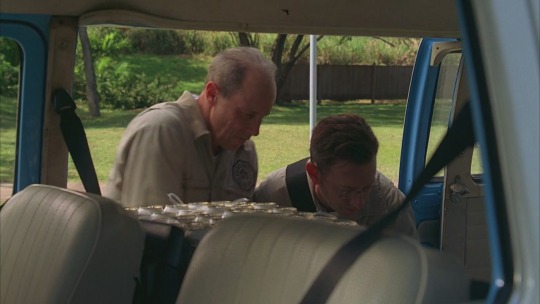
But had Ben assumed leadership of the Others by then? If not, does that mean Charles Widmore was still leading the Others in December 1992? Both the LOSTPEDIA and the WIKIPEDIA sites claimed that Richard Alpert had led the Others' purge against the Dharma Initiative in 1992. But neither site made it clear who had ordered the Purge. And "Dead Is Dead" never gave a clear date on Widmore's exile.
One would assume my choice for the man responsible for ordering the Purge would be Widmore. And you would be right. There seemed a good deal of evidence making him responsible. He had already participated in an earlier purge back in 1954. Ben had revealed time and again his willingness to use violence - even kill those he deemed a threat to himself or for emotional reasons. But the series had also revealed Widmore's willingness to do the same and especially kill in the name of protecting the island. And that included ordering Ben to kill an emotionally unstable Danielle Rousseau and her infant child. Widmore had also sent the murderous Martin Keamy to the island in late Season Three-Season Four to snatch Ben. He had claimed to Locke in (5.07) "The Life and Death of Jeremy Bentham" that he had done so to give Locke the opportunity to become the Others' new leader. Yet, his words to Locke contradicted his words to Ben in London, when he had claimed the island as "his". This scene had occurred nearly a year or more after the events of Season Four.
There is also the matter of whether Keamy had another agenda - namely to kill any of the Oceanic survivors that remained. In "Cabin Fever" he had demanded Sayid reveal the number of other Oceanic survivors and their location. Fortunately, the latter had refused. In a confrontation with the freighter's Captain Gault, Keamy revealed his intentions to "torch" the island. Some claimed that this had been Keamy's angry reaction to his men being attacked by the Smoke Monster. Yet, in (4.08) "Meet Kevin Johnson", Ben had accused the freighter crew of plans to snatch him and kill the island's inhabitants. The only freighter personnel in the room - spiritualist Miles Straume - had remained unusually silent. In the following episode, (4.09) "The Shape of Things to Come", Miles claimed that Keamy and his men were around to serve as security guards for a captured Ben. But there was the revelation that Widmore had set up a false location for the missing Oceanic 815 plane - with a plane wreck and dead bodies included. This is merely an assumption of mine, but I believe Widmore had sent Keamy to not only snatch Ben, but kill the remaining Oceanic survivors as well to maintain the narrative. I found a good deal of clues that led me to suspect Widmore had ordered the Dharma Purge.
After watching the series more than once, I find it increasingly difficult to hold Ben responsible for the Purge. His actions against the Oceanic castaways had featured spying, kidnapping, harassment, threats and manipulation. He rarely resorted to murder - aside from his attempt to kill Locke and his order to kill Sayid, Jin Kwon and Bernard Nader during the events in the Season Three finale, (3.23) "Through the Looking Glass, Part 2". If Ben was truly capable of ordering the Purge, he would have wiped out (or tried) the Oceanic survivors after getting Jack to remove the tumor from his spine. The man had proved incapable of following Widmore's orders to kill Danielle and Alex.
In the end, viewers know that Charles Widmore had been the leader of the Others in 1988-89, when he had ordered Ben Linus to kill Danielle Rosseau and her infant daughter. Viewers know that Ben had refused. Viewers also know that Richard Alpert had led a group of Others in the Purge against the U.S. Army in 1954. He also led the Others' purge against the Dharma Initiative on December 19, 1992. On that same date, Ben killed his father, Roger Linus, in a similar manner – by toxic gas. And viewers know that Ben had eventually replaced Widmore and exiled the latter off the island. Personally, I suspect Widmore had ordered the Purge against Dharma. But I suspect it was an order he had not issued lightly, given the number of years the Others had been in conflict with the Dharma Initiative.
But I cannot say with any authority that Widmore had ordered the Dharma Initiative Purge. If we only knew exactly when Widmore had been exiled, perhaps this mystery of the Purge will finally be cleared.

#lost#lost tv show#lost tv series#lost tv#lost 3x20#3x20 the man behind the curtain#the dharma initiative#the dharma initiative purge#the dharma purge#ben linus#michael emerson#charles widmore#alan dale#richard alpert#nestor carbonell#miles straume#ken leung#martin keamy#kevin durand#roger linus#jon gries#eloise hawking#alice evans#fiona flanagan#jack shephard#matthew fox#hurley reyes#jorge garcia#danielle rousseau#mira furlan
66 notes
·
View notes
Note
What are the lessons that someone with a Purva Ashadha Moon needs to learn in this lifetime? Thank you very much in advance!!! Your answers are so concise and well written! Amazing work!
Hi! Thank you so much for your kind words and for asking such a deep question! 💫
Soul lessons for PA moon:
This Moon can be incredibly self-respecting and emotionally proud. You may hold yourself to very high standards when it comes to emotional conduct, and struggle to let yourself fully fall apart in front of others. One of the lessons here is: vulnerability is not weakness. You don’t have to always be the dignified, composed one.
Because Purva Ashadha is ruled by Venus and connected to refinement and idealism, there can be a tendency to want emotional stories to follow a certain arc. You may try to lead relationships or personal healing in a way that "makes sense" but life doesn’t always follow emotional logic. Learning to sit in the unknown, the messy middle, is huge here.
This Moon has an inner nobility. You feel things so deeply esp emotional injustices, betrayals, beauty, devotion. But others may not always grasp the gravity of your feelings. One big lesson is knowing that your emotional reality is valid even when unmirrored. You don't need constant reflection to know you're right to feel how you do.
Purva Ashadha Moons often carry long emotional memory. You can’t just “move on” from something, and that’s okay. You're not here to forget. The real growth comes when you allow your feelings to take the time they need, without trying to "conclude" them quickly.
This nakshatra has an incredible will & once it believes something is worth it, it will fight for it till the end. The trick is learning what is actually worth your emotional energy. Once you start using your emotional force in service of a higher cause or dharma, your power becomes unstoppable.
If you carry this Moon, trust that you are learning to become your own protector. And that every emotional storm you pass through is actually sharpening your spiritual discernment.
Keep going!
13 notes
·
View notes
Text
Spirits and their common uses and misconceptions
So today I wanted to talk about a few spirits which, not much is so far known of through literary writing, but more so through celestial knowledge. (each spirit will have its own section)
The Pythoness - many Christian and Judea religions view the pythoness spirit as a demon like spirit that is meant to steer one away from Gods path and imbue one with negative thoughts such as death and sickness through the mind, yet I've personally found and many civilizations prior and after that the story is not as such. In yogic practices there is a certain breathe and practice of the kundalini. Kundalini is the term for "a spiritual energy or life force located at the base of the spine", conceptualized as a coiled-up serpent. The practice of Kundalini yoga is supposed to arouse the sleeping Kundalini Shakti from its coiled base through the 6 chakras, and penetrate the 7th chakra, or crown. This allows for an open pathway as a connection to God, elevated spirits and the spirits of the afterlife, our ancestral spirits, within celestial planes. In buddhism giant serpents were seen as protectors of the dharma, the truth that liberates us, standing strong against any attack. Many psychics, seers, mediums, witches and tarot card readers tend to have a spirit who knows one of two things about divination, prophecy and esoteric knowledge, but the pythoness spirit is looked at more like the all seeing eye or the eye of ra and horus. In greek mythology Leto the great she-wolf was cursed to never give birth upon the land as Hera set her out to be cursed by her daughter and for Gaia to not allow her to give birth to her two children. Through Zeus' interference Leto was able to give birth to both Artemis and Apollo. Later Apollo went to go slay a Snake that had threatened Leto and therefore gained the ability to turn into a snake himself. He declared the island previously known as Pythos to be Delphi and as the God of prophecy later became a hub for those seeking answers from great oracles once a year, known as Pythias. These women were great prophets and witches alike that danced with fire and tamed snakes to dance along with them protecting the island from attacks and monsterous threats as to pay respect to Apollo. These were women and men of wild nature who allows there instincts to guide them through the understanding of the great divine. One with nature they became medicine workers, prophets, seers, musicians, dancers, pyromancers, snake charmers, witches and mages and dream weavers.
These great spirits are revered as a highly elevated court in spiritualist practices, sometimes just perceived as the spirits of tarot decks or oracular objects they are forgotten as being far too complex to be seen as just that. Through the force of light they bring great aid to those they are on spiritual journey's with, they rid of hexes, curses and spiritual illnesses. They guide through prophetic dreams, clairvoyancy, clairsentience, clairaudience and mediumship. They are capable of conjuring powerful spirits and the spirits of the dead (necromancy), as well as a straight line communication to God, gods and goddesses. They move through the celestial tides of the universe and bring forth great health, wealth, abundance, freedom and spiritual knowledge to those they favor. They are quite benevolent spirits who help bring in death or the spirit of change for the better and to rid old stubborn ways of the past. They are great teachers of dark and light magic. They aid in learning and music as well. Helping those with charisma and the ability to enchant and/or charm enemies and others alike. They have such affinity towards chocolates, gold, silver, wine, fire, candles, light, mirrors, divination tools, water, flowers and floral scents, perfumes, snakes and music. There number is 7 and their flower is the rose, particularly the white rose, but other colors are fine as well. They also enjoy sunflowers, as they venerated Apollo, and the Anise star. Their colors are Red, burgundy, gold, emerald green, white, silver, purple, and brown. Yet each is different and might prefer a royal blue for all we know each spirit is different to another so getting to know ones spiritual court is quite important. Stones like diamond, ruby, jade, emerald, citrine, labradorite and amethyst can be given to such spirit as well as Selenite and Amber each representing Artemis and Apollo. These spirits can sometimes be confused with a better known spirit Santa Martha la Dominadora. You may even have both within your spiritual court, but they two hold many similarities.
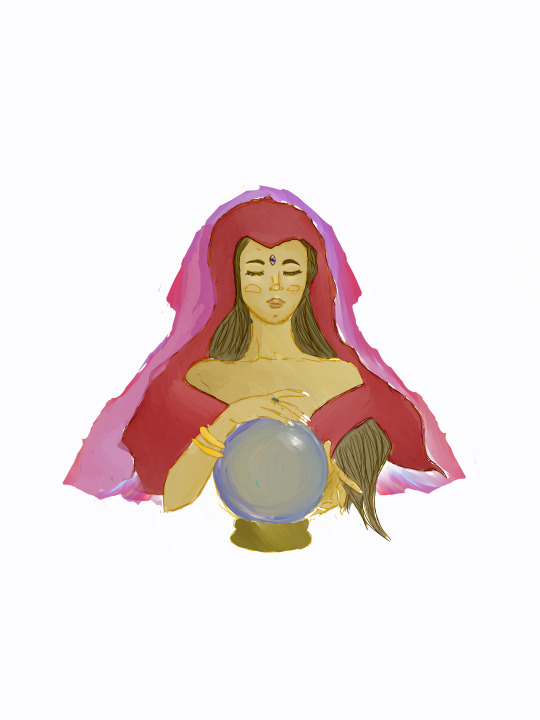
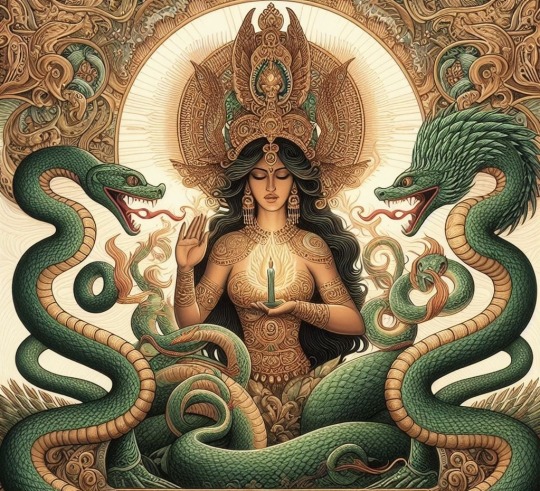
Prayer to the Pythoness
O Blessed Pythoness, I invoke your humble yet wild nature into my life, I give you thanks for the visions told and untold and for the sight to see my path clearly. May your connection to God and all living things be great and full of love and respect. May your tides of wisdom bring peace to the land and bestow upon me and my loved ones a blessed hand. Lady of the fire, imbue me with your holy flames may they burn away all evil done unto me by others or by my own hand. May your light charm those who seek no good into doing acts of kindness and greatness and may your soothing voice bring sweetness and riches to the land and seas. You the one who tamed the dragon and serpent to your gracious hand. Tame my enemies and bring good fortune to those in need. Help the world against devastation and may your great cobra bring forth the promise land. Lady of the land and sea, conjure your celestial winds to protect me and bring good news from the heavenly lands. Through the eye of the one who can see I plea to you humbly and in need. As it is. So mote it be. Amen
Say this prayer with Psalm 91 3x and Psalm 4 3x under the flame of a white(or yellow) light end with a Glory be. It will help receive divine messages through divination or prophetic dreams and help transmute negative energy and protect against evil eye.
Oracion a La Pitonisa
O Bendita Pitonisa, Yo invoco tu humilde y salvaje espiritu de naturaleza entre mi vida, te doy las gracias por los visiones contado y no contado y por la vista para ver mi camino claramente. Que tu conexión a Dios y a todas criaturas vivas sea lleno de gran amor y respeto. Que las olas de sabiduria traen paz a toda la tierra y otogar a mi y mis seres queridos tu mano bendicida. Mujer de los fuegos, envuelvame con tus llamas benditas que me liberan de cualquier maldad sea enviado por enemigos o que han nacido de mi propia mano. Que tu luz encandile a los que no buscan el bien y les transformas hacer actos de carino y grandeza y que tu voz encantadora trae dulcisimiento y riquezas a la tierra y los mares. Tu que haz vencido el serpiente y el dragon con tu mano graciosa. Ayuda al mundo contra la devastación y que tu tierra prometida sea traido por tu gran cobra. Mujer de la tierra y mar, protejame con los vientos celestiales y que traen buena noticias del cielo. A través del ojo del que puede ver te suplico humildemente y de necesidad. Como es. Asi sera. AMEN
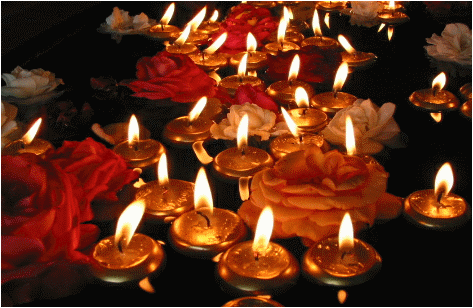
#espiritismo#spiritualism#spirituality#magic#white magic#spirits#pythia#pythoness#pitonisa#witchcraft#prayers#spiritualcourt#sanse#spells#brujo#bruja#brujeria#pagan#animism#ritual#occult#occultism#magick#esoteric#god#elevatedspirits#los espiritus#espiritus elevados
65 notes
·
View notes
Text
Peng Doesn't Like Farts

Fans of Lego Monkie Kid, as many of you may already know, Peng is based on an ancient monster king appearing in chapters 74 to 77 of Journey to the West (Xiyouji, 西遊記, 1592). In the end of his arc, he is trapped above the Buddha's throne and submits to Buddhism. But you may not know that this very same character appears in a later novel, The Complete Vernacular Biography of Yue Fei (Shuo Yue quanzhuan, 說岳全傳, 1684 CE; a.k.a. The Story of Yue Fei). Peng is exiled from paradise for ... and I'm not joking ... killing a stellar spirit for farting during the Buddha's sermon.
Chapter one of Yue Fei's biography reads:
Let’s talk about the Buddha Tathagata at the Great Thunderclap Monastery in the Western Paradise. One day, he sat on a nine-level lotus throne, and the Four Great Bodhisattvas, the Eight Great Vajra Warriors, the five hundred Arhats, the three thousand Heavenly Kings, nuns and monks, male and female attendants, all of the heavenly sages who protect the Dharma, gathered to listen to his lecture on the Lotus Sutra. His words were like flowers and precious jewels raining from the heavens. But, at that time, a star-spirit, the Maiden Earth Bat, who had been listening to the lecture from beneath the lotus throne, couldn’t bear it any longer and unexpectedly let out a stinky fart. The Buddha was a great, merciful lord, so he didn’t mind even the slightest bit. But don’t sympathize with the Dharma protector above his head, the “Great Peng, the Golden-Winged King of Illumination,” whose eyes shone with golden light and whose back was a scene of auspiciousness. He became angry when he saw the nasty, filthy Maiden Earth Bat, and so he unfurled both his wings and dropped down to kill the spirit by pecking her on the head. The light-point of her soul shot out of the Great Thunderclap Monastery and went to the Lands of the East (China) in the world below to find a mother and reincarnate. She was reborn as a daughter of the Wang clan. She would later marry the Song Prime minister Qin Hui (1091-1155) and come to cruelly kill the righteous (i.e. Yue Fei) as a means to get revenge against today’s enemy. We will talk about this later. Let’s return to the Buddha, who saw what happened with his all-seeing eyes and exclaimed, “Good! Good! It turns out that this is an episode of karma (cause and effect).” Then he called the Great Peng bird to come closer and shouted, “You evil creature! You already took refuge in my teachings. How can you not follow the five precepts by daring to commit such a horrible crime? I don’t need you here; you will descend to the mortal world to pay off your (karmic) debt and wait until you have fulfilled your work. Once that is completed, only then will I allow you to return to the mountain to achieve the right fruit (Buddhist merit).” The Great Peng complied with the decree, flying out of the Great Thunderclap Monastery directly to the Lands of the East to be reincarnated. We will stop here (translation by me). 且說西方極樂世界大雷音寺我佛如來,一日端坐九品蓮臺,旁列著四大菩薩、八大金剛、五百羅漢、三千偈諦、比丘尼、比丘僧、優婆夷、優婆塞,共諸天護法聖眾,齊聽講說妙法真經。正說得天花亂墜、寶雨繽紛之際,不期有一位星官,乃是女土蝠,偶在蓮臺之下聽講,一時忍不住,撒出一個臭屁來。我佛原是個大慈大悲之主,毫不在意。不道惱了佛頂上頭一位護法神祗,名為大鵬金翅明王,眼射金光,背呈祥瑞,見那女土蝠污穢不潔,不覺大怒,展開雙翅落下來,望著女土蝠頭上,這一嘴就啄死了。那女土蝠一點靈光射出雷音寺,徑往東土認母投胎,在下界王門為女,後來嫁與秦檜為妻,殘害忠良,以報今日之讎。此是後話,按下不提。 且說佛爺將慧眼一觀,口稱:「善哉,善哉��原來有此一段因果。」即喚大鵬鳥近前,喝道:「你這孽畜!既歸我教,怎不皈依五戒,輒敢如此行兇?我這裡用你不著,今將你降落紅塵,償還冤債,直待功成行滿,方許你歸山,再成正果。」大鵬鳥遵了法旨,飛出雷音寺,徑來東土投胎不表。
#Great Peng#Golden-Winged Peng#Peng#Great Roc#Journey to the West#JTTW#Sun Wukong#Monkey King#Lego Monkie Kid#LMK#Azure Lion#Demon Bull King#Yellow Tusk Elephant#Celestial realm#sworn brothrs#smelly farts#farts
180 notes
·
View notes
Text
This little protector of my Dharma ✨
Bhagwan mujhe kuch de na de, lekin isse sabse zyada khushi, sampati aur healthy life de


16 notes
·
View notes
Note
i humbly request for angsty found family prompt 11 ft zhao yuanzhou because i love to see my blorbo suffering. angst no comfort is my favourite thing in this whole wide world ❤️🙏
11. still having to sort their feelings out on their own because they can't stand to be seen in an emotional state
-> I chose to write about the aftermath of episode 17, so spoilers under the cut for those who haven't watched it yet.
---
It must've been a nightmare, Zhao Yuanzhou told himself.
He'd barely sensed it– between the malicious energy rousing every single violent thought he'd suppressed and having to restrain himself from attacking his friends, he hadn't the luxury to focus on his surroundings.
So he barely registers it when Ying Zhao bids his grandson goodbye, sacrificing his dharma in order to suppress Zhao Yuanzhou, doesn't realise it until he blacks out and wakes to his hollow-eyed friends.
It doesn't take him long to figure it out– the energy surrounding Mount Kunlun was different now, the warmth and steadiness of Ying Zhao’s inner energy now stripped away, leaving it with a barely there, weaker and unpracticed inner energy.
The mountain god of Mount Kunlun has changed.
—
I cannot kill you, Ying Zhao had said back then, with a kind– but sad– smile.
“You must,” Zhao Yuanzhou had stubbornly insisted, oblivious to the pain in the elder’s eyes, blinded by his own suffering.
I will think of something.
And he had trusted Ying Zhao to, foolishly convincing himself that the wise mountain god would find a way.
Never did he expect that Ying Zhao would actually–
Would actually–
Zhao Yuanzhou stumbles out of his room, suddenly unable to breathe, and takes a lesser known route to the hidden cave he and Li Lun had found during their stay on Mount Kunlun.
(Not even Ying Lei knew of this place, he was sure).
And oh gods– Li Lun.
Li Lun would have to know about this too, would have to be told that his old friend had passed.
(Would Li Lun blame him for Ying Zhao’s death?
There was a high possibility. Ying Zhao had extended to them such kindness, had taken them in and guided them when they were young.
And how had Zhao Yuanzhou repaid that debt?
– He had all but asked Ying Zhao to sacrifice himself, had forced his hand, when he still had such a young grandson who needed him.
That was another point added to his ever growing list of sins).
Zhao Yuanzhou sits down heavily, his legs unable to support him any longer.
He feels the cold, rough stone tearing at the fabric of his robes, the uncomfortable jagged walls of the cave as he leans against it, attempting to calm himself down.
He would not allow himself to be so vulnerable around the Demon Hunting Bureau, could not allow them to see him like this.
But for now– and he had a while before any of them started to look for him, he thinks– Zhao Yuanzhou would allow himself a moment of weakness, give himself some time to properly mourn Ying Zhao.
(You have driven another friend to ruin, the malicious voice whispers, curling a freezing hand around his heart.
Ying Zhao caree so much for you, treated you as one of his own despite you being a demon, despite the danger that you posed.
A brand around his heart, squeezing it until Zhao Yuanzhou saw spots dancing across his vision.
He was an honorable man, one who wholeheartedly cared for the Wilderness and took pride in his job as one of the protectors of the Wilderness and you took advantage of that.
The air seemed to have rushed out of his lungs, leaving him empty and heaving for air, a pathetic heap on the cave floor–)
Rather blankly, almost as if he were watching from outsider's eyes, he watches as tears which he had thought himself incapable of now stained his sleeves, running in an uncontrollable stream down his face.
—
Zhao Yuanzhou does not know how long he spends in that cave, only that it was daybreak by the time Zhuo Yichen finds him, and he could no longer feel his legs, too numb from sitting on the cold cave floor.
Mortal bodies truly were too weak, he laments.
(And yet, as he'd just experienced– neither were gods or demons as indestructible as they seemed, either).
There would be more time to properly grieve Ying Zhao again. Zhao Yuanzhou tucks away his sorrow, firmly yanking on his aloof mask over his face once more.
For now, they needed to find a way to fix the Baize seal.
#fangs of fortune#zhao yuanzhou#ying zhao#ying lei#following episode 17#two fics in one day??? perhaps i have truly defeated the burnout#(nah that is a lie. I'll have no time to write for the next two days so)#rose writes#not beta read btw#throwing this at tumblr and running off to bed as usual
18 notes
·
View notes
Text

Mahakala is one of the great Dharmapala (Protector of the Dharma) in Tibetan Buddhist Cosmology. His domain is the void, and he maintains command of time and death. He is depicted blue or black as all colors absorbed represent the infinitude of absolute reality as is all life is absorbed into him in time. As a fearsome deity, he reminds his believers of the wrath that would incur if they were to stray from the Dharma. The five skulls on his crown represent the five Kleshas (negative aspects such as ignorance, selfishness, pride, envy, and depression) that would be transformed into the five wisdoms (knowledge, discipline, observance, equanimity, self-reflection) by his power. His roots tie back to the Hindu god Bhairava (an Avatar of Shiva) and has since become an important figure in many Buddhist Sects. When the universe ends, there will be no Chaos, just the void at the end of time, and there, Mahakala remains.

#hades 2#hades#hades fanart#hades supergiant#hades game#supergiant hades#oc art#digital art#artists on tumblr
50 notes
·
View notes
Text

Ganapati, Maha Rakta A Tantric Buddhist form of Ganapati (Ganesha) related to the Chakrasamvara Cycle of Tantras. This form of Ganapati is regarded as an emanation of Avalokiteshvara. Lama Thanka Painting School @lama_thank
The Story of Avalokiteshvara and Ganesha
From the chapter of Ganesha-Ganapati in Zasep Rinpoche’s book Source of All Buddhist Protectors, he synopsized the charming story of how Avalokiteshvara “convinced” Ganesha to protect the Buddha Dharma:“Avalokiteshvara knew Ganesha was a powerful god and wanted him to become a Dharma protector. Avalokiteshvara decided the only way to do this was to manifest as an even more powerful Ganesha. One day Ganesha and his attendants went on an outing… While they were gone Avalokiteshvara manifested himself as Ganesha and entered the royal palace. The consort of Ganesha and her entourage greeted him and offered flowers and music….when the real Ganesha returned to the royal palace, the consort and entourage were very confused and told him the great Maha Deva Ganapati was already sitting on the golden throne! … Then Ganesha was overwhelmed by the power of Avalokiteshvara; right away he took refuge and the Bodhisattva vows from him, to protect and maintain the holy Dharma.” OM AH GA HUM SVAHA
25 notes
·
View notes
Text

Yarnaby the Guardian, protecting your dreams.
I was inspired by my favourite flag, cos holding a sword like that is like a guardian of dharma. A protector of justice.
5 notes
·
View notes